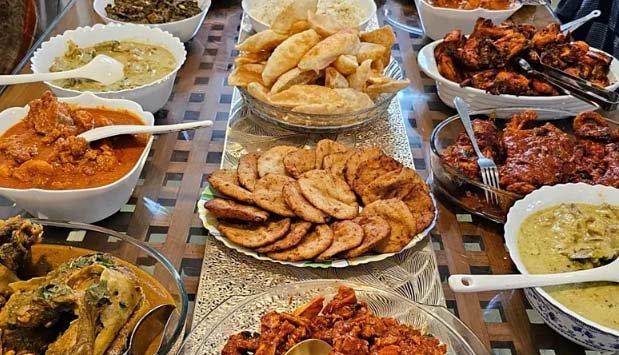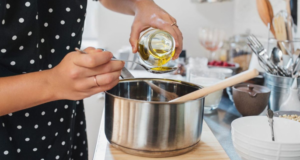
For more than 700 years, an extraordinary tradition has been maintained in southern India, where grooms are presented with a parade of freshly prepared dishes by their new mother-in-law.
India is renowned for opulent multi-day weddings packed with extravagant feasts. But of all the nation’s matrimonial customs, perhaps none is as unique – or delicious – as Puyyappla Perukkal; a centuries-old Mappila Muslim tradition from the Keralan city of Thalassery.
Renowned for its cardamom, pepper and clove production, Thalassery is a rather unassuming seaside city that was once one of the hubs of the global spice trade. Before the British established Thalassery as their first settlement along south-western India’s Malabar Coast in 1683, Portuguese navigators and Dutch traders had vied for its control. In the centuries since, a blend of Arabian, Persian, Dutch, British, and Indian influences have come together to create one of India’s most diverse gastronomic melting pots – and some of its most mouth-watering dishes.
But of the many cultures who have left their gastronomical mark on the city, perhaps none is as distinct as the Mappila Muslims, who have maintained an astonishing matrimonial tradition that is believed to have endured since the 13th Century.
Known as the Puyyappla Perukkal (“nurturing the son‑in‑law”), this centuries-old custom sees the groom live in the bride’s house alongside his new mother-in-law as a guest of honour as she and other relatives prepare as many as 100 different dishes for him that rarely repeat during a 40-day period. Each day, the bride’s mother and other elders serve him an array of elaborate foods prepared under the guidance of matriarchal home cooks.
The rite is believed to be rooted in Kerala’s ancient matrilineal Marumakkathayam system, in which property and inheritance was passed down through women in some Hindu communities. Over time, this system is thought to have inspired Muslims in Thalassery to create Puyyappla Perukkalto honour their new sons-in-law and strengthen family ties. And while several other Mappila communities in nearby towns have started adopting this epic 40-day feast in recent decades, according to PM Jabir of the area’s well-known Maliyakkal family, “this tradition is borrowed from what we follow here in Thalassery”.
Historically, every Mappila family in Thalassery practised Puyyappla Perukkal. In Mappila culture, welcoming a son-in-law into the family is a sign of great respect, and across India, the number 40 is considered significant in life events and symbolises blessing and reflection in local Islamic culture. In the event that the bride’s mother is deceased, ill or unable to perform the duty, the role is taken up by another of her female elders.
“The day after the wedding, at dawn, the groom is served bread sizzling in ghee (clarified butter), pazham vatti (banana fritter) and boiled eggs, followed by breakfast of different kinds of pathiri (rice flour flatbread), ari rotti (rice flatbread) or golden ney pathiri (rice bread fried in ghee) paired with lamb curry,” said Rubeena Kalathiyath, a cook at The Heritage 1866, a restaurant and 159-year-old heritage home located in Thalassery.
After breakfast, the groom leaves for his home, returning in the evening for an extravagant spread of crisp lentil vadas (deep-fried savory fritter), delicate unnakaya (steamed and mashed plantains filled with grated coconut, cardamom and sugar) and petti pathal (chicken box patties).
Lunch and dinner is typically a heavier affair. During these meals, items such as aleesa (wheat and chicken stew with coconut milk), muttamala (sweet egg yolk threads in sugar syrup), kakka roti (rice bread with fillings), mutta sirka (raw rice with egg deep fried in oil), moodi pathiri (layered rice bread), ghee rice (rice made in clarified butter) and mutton biryani may be served.
“I have seen my mother and grandmother preparing all this. That’s how I slowly developed a passion for cooking these traditional dishes,” said Kalathiyath, who now single-handedly makes most of these dishes with homemade garam masala (a blend of toasted and ground whole spices) for the guests at the homestay.
By the second week, chicken roasts and mutton stews dominate dinners. “The items are too many to be named,” Kalathiyath joked. She also explained that traditionally during the 40-day feast, there was an unwritten series of rules meant to reinforce respect and reciprocity between the groom and his new mother-in-law. One such practice involves meen panam (“fish money”).
 Weekly Bangla Mirror | Bangla Mirror, Bangladeshi news in UK, bangla mirror news
Weekly Bangla Mirror | Bangla Mirror, Bangladeshi news in UK, bangla mirror news







